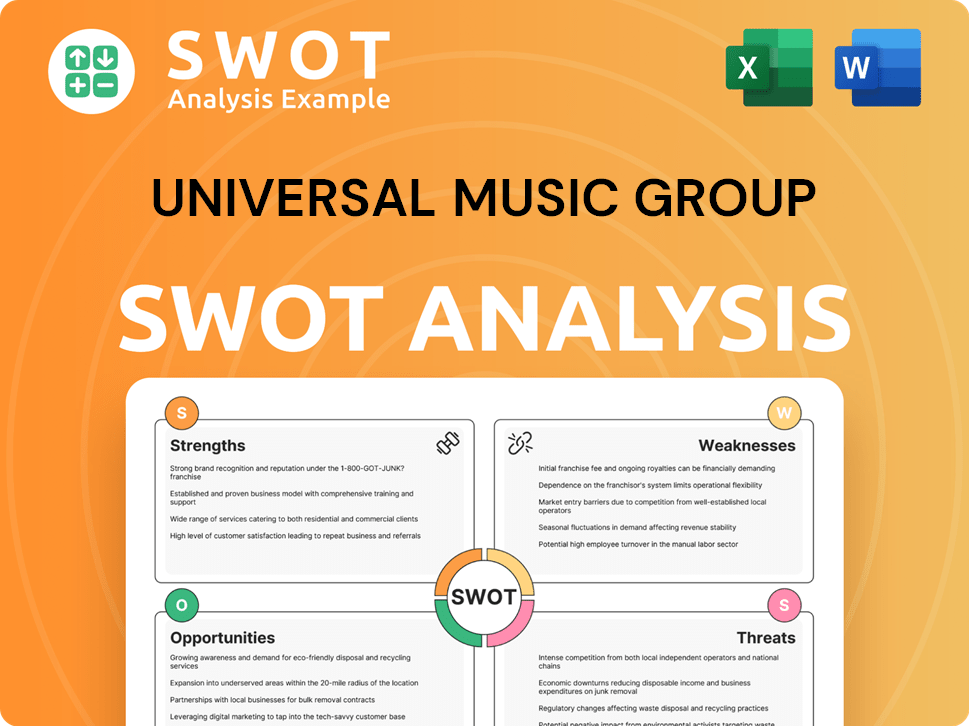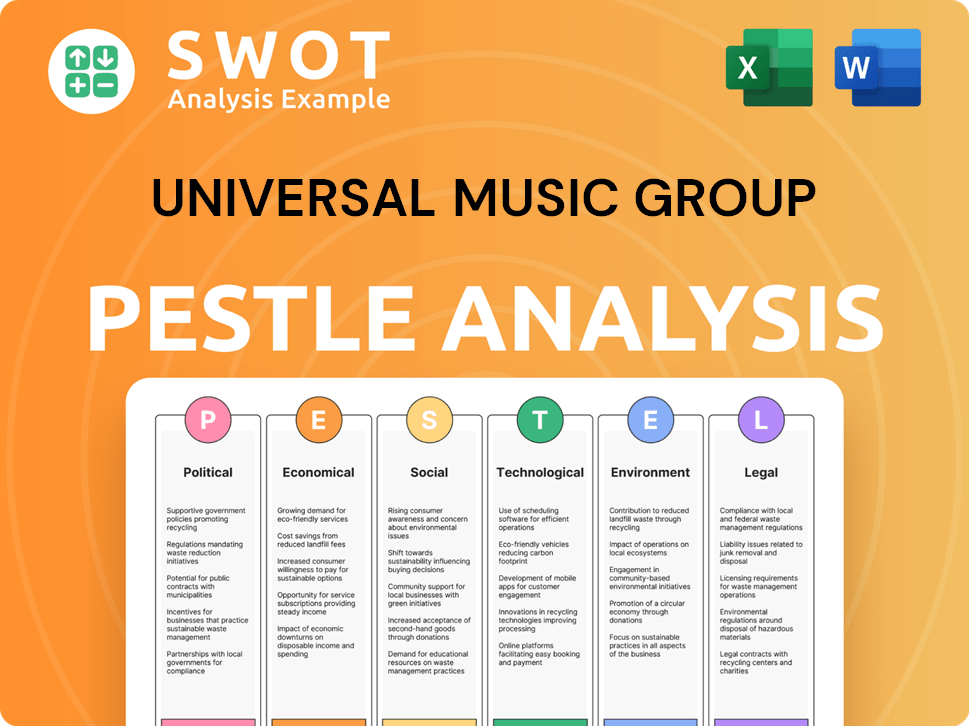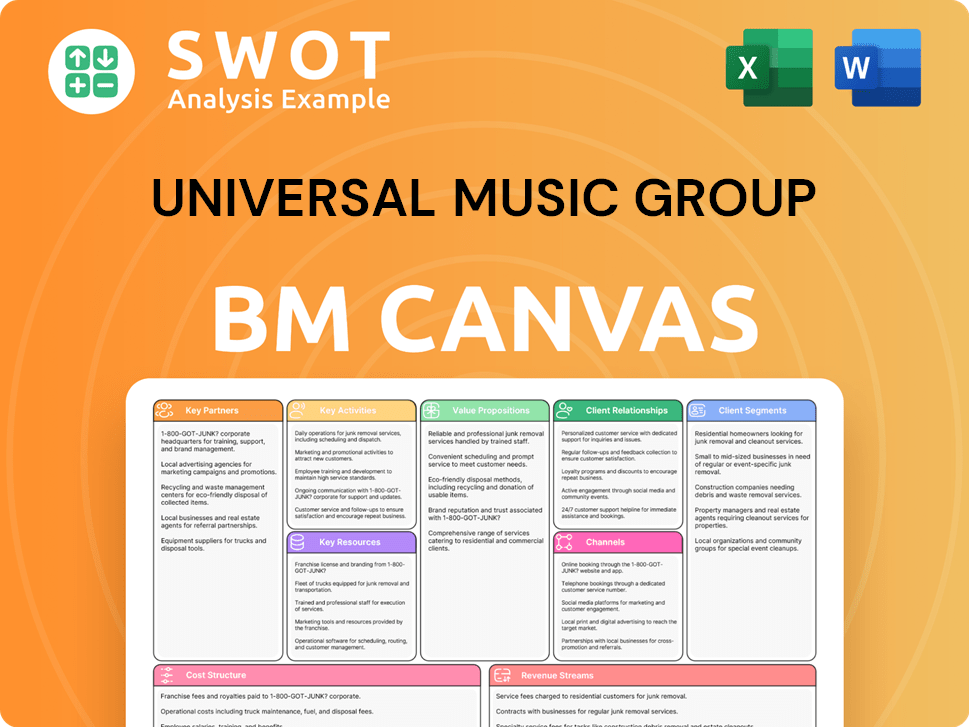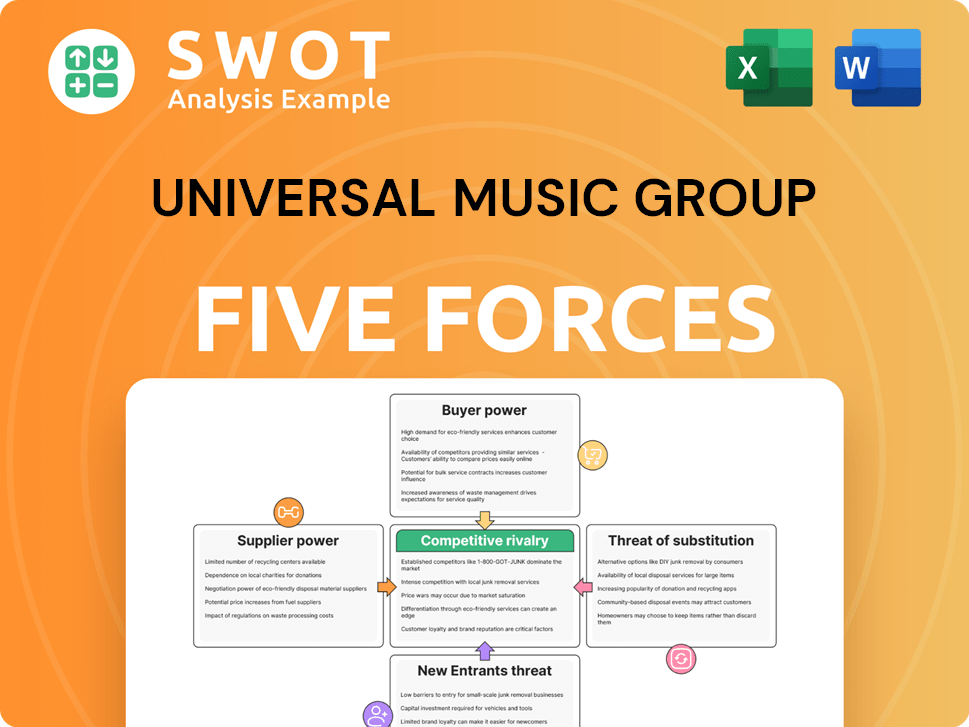Universal Music Group Bundle
Who Really Owns Universal Music Group?
Unraveling the Universal Music Group SWOT Analysis is key to understanding its position in the music industry. The evolution of UMG's ownership, from its roots to its current structure, is a critical factor in understanding its strategic direction and market influence. Discovering who owns UMG is essential for any investor or industry observer.

Understanding the UMG ownership structure is crucial, especially considering its spin-off from Vivendi and subsequent public listing. As the largest music company globally, understanding who holds the controlling interest in UMG offers valuable insights into its future. This exploration will delve into the major shareholders and the impact of these shifts on the company's financial performance and strategic decisions within the competitive music label landscape.
Who Founded Universal Music Group?
The story of Universal Music Group (UMG) began in 1962 with the merger of MCA Inc. and American Decca in the United States. MCA, then known for Universal Pictures, had both a music division and a film studio. This marked the initial step in what would become the world's largest music label.
The ownership of Universal Music Group has seen significant shifts over time, reflecting broader changes in the entertainment industry. From its early days, the company has been shaped by mergers, acquisitions, and strategic decisions that have defined its position in the global music market. Understanding the evolution of UMG ownership is key to grasping its current structure and influence.
The journey of UMG ownership has been marked by several significant transitions. In November 1990, the Japanese multinational conglomerate Matsushita Electric acquired MCA for $6.59 billion. This acquisition was a pivotal moment, setting the stage for future developments in the company's ownership and strategic direction.
Matsushita Electric acquired MCA in November 1990 for $6.59 billion, which included the music division.
In April 1995, Seagram, a Canadian conglomerate, purchased an 80% stake in MCA from Matsushita for $5.7 billion.
MCA was rebranded as Universal Pictures in December 1996, and the music division was relaunched as Universal Music Group.
Seagram acquired PolyGram for $10.6 billion in May 1998, which was later merged into Universal Music Group.
The acquisition of PolyGram significantly expanded UMG's reach and solidified its status in the global music industry.
Vivendi later acquired Seagram, leading to further changes in UMG's ownership structure and strategic direction.
The early ownership of Universal Music Group underwent significant changes. Seagram's acquisition of PolyGram for $10.6 billion in May 1998 was a major strategic move, which was integrated into Universal Music Group a year later. This series of acquisitions and mergers by Seagram was instrumental in solidifying UMG's position as a major player in the global music industry. For more insights into the competitive landscape, consider reading about the Competitors Landscape of Universal Music Group.
The early history of UMG is marked by significant ownership changes and strategic acquisitions that shaped its current structure.
- 1990: Matsushita Electric acquired MCA for $6.59 billion.
- 1995: Seagram acquired an 80% stake in MCA for $5.7 billion.
- 1996: MCA was rebranded as Universal Pictures, and the music division became Universal Music Group.
- 1998: Seagram acquired PolyGram for $10.6 billion, which was later merged into UMG.
Universal Music Group SWOT Analysis
- Complete SWOT Breakdown
- Fully Customizable
- Editable in Excel & Word
- Professional Formatting
- Investor-Ready Format

How Has Universal Music Group’s Ownership Changed Over Time?
The evolution of UMG ownership has been marked by significant shifts, particularly in the past two decades. Initially, Vivendi, a French media conglomerate, gained control in 2000 through the acquisition of Seagram. By February 2006, Vivendi held complete ownership, solidifying its position as the parent company. This period set the stage for future transformations, including strategic investments and the eventual public listing.
A pivotal change occurred between 2020 and 2021. Tencent, through a consortium, acquired a 10% stake in March 2020, followed by another 10% in January 2021. Prior to UMG's IPO, Pershing Square Holdings also acquired a 10% stake. The most significant event was the spin-off and public listing on the Euronext Amsterdam exchange on September 21, 2021. Vivendi distributed 60% of UMG to its shareholders while retaining a 10% stake. These moves diversified the UMG ownership structure, impacting its strategic direction and global reach.
| Date | Event | Impact |
|---|---|---|
| 2000 | Vivendi acquires Seagram | Vivendi becomes the majority owner of UMG. |
| 2006 | Vivendi acquires remaining stake | Vivendi holds full ownership. |
| March 2020 | Tencent-led consortium acquires 10% stake | Diversifies ownership, introduces Asian market influence. |
| January 2021 | Tencent increases stake to 20% | Strengthens Tencent's position. |
| September 2021 | UMG IPO on Euronext Amsterdam | UMG becomes a publicly traded company, Vivendi distributes 60% of shares. |
As of January 2022, the major shareholders of Universal Music Group included the Bolloré family (28%), Tencent (20%), and Pershing Square Holdings (10%). The remaining shares were held by public shareholders. This ownership structure has positioned UMG as the largest music company globally, especially in the streaming market. The strategic investments by Tencent have been particularly impactful, enhancing UMG's presence in the Asian market. To learn more about the company's beginnings, you can read about the Brief History of Universal Music Group.
Who owns UMG? The ownership structure is now diversified, with significant stakes held by various entities.
- The Bolloré family holds a significant portion.
- Tencent has a substantial stake, impacting the Asian market.
- Pershing Square Holdings is also a key shareholder.
- The majority of shares are publicly traded.
Universal Music Group PESTLE Analysis
- Covers All 6 PESTLE Categories
- No Research Needed – Save Hours of Work
- Built by Experts, Trusted by Consultants
- Instant Download, Ready to Use
- 100% Editable, Fully Customizable

Who Sits on Universal Music Group’s Board?
The current board of directors of Universal Music Group (UMG) plays a critical role in the company's governance. Sherry Lansing serves as the chairwoman, while Lucian Grainge holds the positions of chairman and CEO. Other key board members include Vincent Vallejo, Haim Saban, and Luc van Os. These individuals were proposed for re-appointment at the 2025 Annual General Meeting (AGM). Vincent Vallejo's proposed term was for one year, whereas Sherry Lansing, Haim Saban, and Luc van Os were proposed for two-year terms. Bill Ackman, CEO of Pershing Square Capital Management, L.P., resigned from the board on May 14, 2025, due to increasing commitments elsewhere.
The composition of the board reflects a mix of executive and non-executive directors, ensuring a balance of perspectives in decision-making. The board's structure and the terms of its members are designed to maintain stability and effective oversight of the company's operations. This structure is vital for navigating the complexities of the music industry and maintaining UMG's position as a leading music label.
| Board Member | Role | Term |
|---|---|---|
| Sherry Lansing | Chairwoman | Two years |
| Lucian Grainge | Chairman and CEO | Ongoing |
| Vincent Vallejo | Executive Director | One year |
| Haim Saban | Non-Executive Director | Two years |
| Luc van Os | Non-Executive Director | Two years |
Regarding voting power, Vivendi, the former parent company, established a 'one share, one vote' structure for UMG's public listing. This approach means all shareholders are treated equally, without preferred shares or multiple voting rights. Board members' terms are limited to two business years. This commitment to equal voting rights ensures that no single entity has outsized control, promoting fairness and transparency in UMG's governance. Understanding the marketing strategy of Universal Music Group helps to understand the company's direction.
The board of directors at Universal Music Group is structured to ensure effective governance and oversight.
- Sherry Lansing serves as chairwoman, with Lucian Grainge as chairman and CEO.
- The voting structure follows a 'one share, one vote' principle, ensuring equal shareholder rights.
- Bill Ackman resigned from the board in May 2025.
- The board includes a mix of executive and non-executive directors.
Universal Music Group Business Model Canvas
- Complete 9-Block Business Model Canvas
- Effortlessly Communicate Your Business Strategy
- Investor-Ready BMC Format
- 100% Editable and Customizable
- Clear and Structured Layout

What Recent Changes Have Shaped Universal Music Group’s Ownership Landscape?
The UMG ownership landscape has shifted significantly in recent years, particularly following its spin-off from Vivendi and subsequent public listing on the Euronext Amsterdam exchange in September 2021. Before the IPO, a Tencent-led consortium and Pershing Square Holdings acquired substantial stakes. As of January 2022, the Bolloré family, through Vivendi, held a significant 28% ownership share.
Recent developments in 2025 include Pershing Square's decision to sell a portion of its UMG position, aiming to raise approximately $1.4 billion from the sale of a 2.7% stake in March 2025, reducing its portfolio position to 17%. This move is, in part, to prepare for a planned U.S. listing for Universal Music Group, a move advocated by Bill Ackman.
| Ownership Changes | Date | Details |
|---|---|---|
| Tencent-led Consortium | March 2020 & January 2021 | Acquired a 20% stake in UMG. |
| Pershing Square Holdings | Pre-IPO | Acquired a 10% stake. |
| Bolloré Family (Vivendi) | January 2022 | Retained a 28% ownership. |
| Pershing Square Holdings | March 2025 | Sold a 2.7% stake, reducing position to 17%. |
Universal Music Group has remained active in acquisitions, completing 17 acquisitions, averaging nearly two acquisitions annually over the past three years as of April 2025. Their most recent acquisition in March 2025 was 8ball Music, a multi-genre music label. Furthermore, the proposed acquisition of Downtown Music Holdings by Virgin Music Group, a division of UMG, for $775 million, announced in December 2024, is under regulatory review due to potential market concentration concerns. For more insights into the company's strategic approach, consider reading about the Target Market of Universal Music Group.
The ownership structure of UMG has evolved significantly since its spin-off. Key players include institutional investors and major shareholders.
UMG has actively expanded its portfolio through acquisitions. Recent acquisitions include 8ball Music in March 2025.
Focus on streaming revenue and artist-centric models are key trends. New agreements with platforms like Amazon and Spotify are in place.
The planned U.S. listing and continued acquisitions suggest a strategy for growth. The company is the largest music company by revenue.
Universal Music Group Porter's Five Forces Analysis
- Covers All 5 Competitive Forces in Detail
- Structured for Consultants, Students, and Founders
- 100% Editable in Microsoft Word & Excel
- Instant Digital Download – Use Immediately
- Compatible with Mac & PC – Fully Unlocked

Related Blogs
- What are Mission Vision & Core Values of Universal Music Group Company?
- What is Competitive Landscape of Universal Music Group Company?
- What is Growth Strategy and Future Prospects of Universal Music Group Company?
- How Does Universal Music Group Company Work?
- What is Sales and Marketing Strategy of Universal Music Group Company?
- What is Brief History of Universal Music Group Company?
- What is Customer Demographics and Target Market of Universal Music Group Company?
Disclaimer
All information, articles, and product details provided on this website are for general informational and educational purposes only. We do not claim any ownership over, nor do we intend to infringe upon, any trademarks, copyrights, logos, brand names, or other intellectual property mentioned or depicted on this site. Such intellectual property remains the property of its respective owners, and any references here are made solely for identification or informational purposes, without implying any affiliation, endorsement, or partnership.
We make no representations or warranties, express or implied, regarding the accuracy, completeness, or suitability of any content or products presented. Nothing on this website should be construed as legal, tax, investment, financial, medical, or other professional advice. In addition, no part of this site—including articles or product references—constitutes a solicitation, recommendation, endorsement, advertisement, or offer to buy or sell any securities, franchises, or other financial instruments, particularly in jurisdictions where such activity would be unlawful.
All content is of a general nature and may not address the specific circumstances of any individual or entity. It is not a substitute for professional advice or services. Any actions you take based on the information provided here are strictly at your own risk. You accept full responsibility for any decisions or outcomes arising from your use of this website and agree to release us from any liability in connection with your use of, or reliance upon, the content or products found herein.